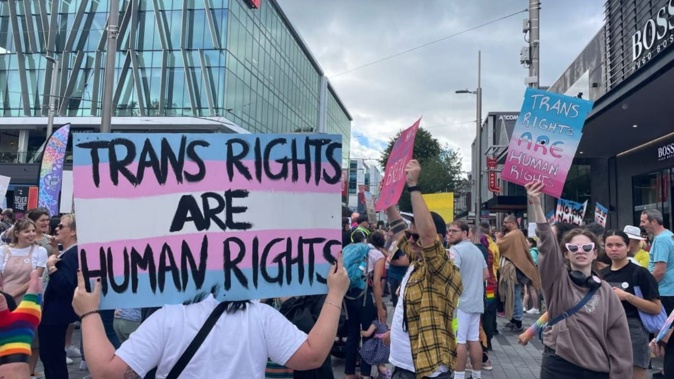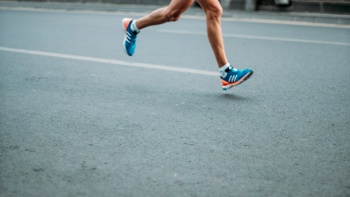
The Government is threatening to withhold millions of dollars of public funding from New Zealand sports bodies if they do not comply with a push to separate transgender athletes from grassroots competitions.
The hardline and potentially divisive policy from the Government sets out the agenda to “ensure publicly funded sporting bodies support fair competition that is not compromised by rules relating to gender”.
The policy is led by New Zealand First, whose sport and recreation spokesman Andy Foster says it is “about fairness and safety in sport for women”.
However, transgender athlete and two-time national champion mountain biker Kate Weatherly fears it will lead to athletes being forced into men’s competitions or sidelined completely.
While previous Governments have left sporting organisations to work through the vexed transgender space at arm’s length, the National-led regime intends to tackle the issue head-on.
International sporting bodies, including cricket, rugby league and swimming among others, have banned transgender women from their respective elite female codes.
The NZ First-National policy agreement, however, applies to the amateur end of the spectrum by targeting participation in community sports.
Given the minimal number of transwomen competing in amateur sports, Weatherly fears it could lead to their exclusion from the grassroots arena.
Sport and Recreation Minister Chris Bishop was uncomfortable discussing the coalition agreement.
“New Zealand First are very keen to make sure we have an inclusive environment and atmosphere for everybody – and that rules relating to gender don’t get in the way of that,” Bishop told the Herald.
“It is a tricky one, a thorny issue. There’s strong views on both sides of the debate. I’ll work through that with the relevant sporting bodies.
“Ultimately it’s got to go over to sporting bodies to make sure that we have fair competition.”
/cloudfront-ap-southeast-2.images.arcpublishing.com/nzme/M3LGXUMHRVBRHAMJPQA3IGBNTY.jpg) Sport and Recreation Minister Chris Bishop was uncomfortable discussing the coalition agreement about transgender athletes. Photo / Marty Melville
Sport and Recreation Minister Chris Bishop was uncomfortable discussing the coalition agreement about transgender athletes. Photo / Marty Melville
Foster, a former Wellington mayor, outlined the rationale for attempting to separate transwomen from female community sports.
“It’s about fairness and safety in sport for women in particular,” he said.
“Looking at some of the debate that’s been across different sports codes around the world about transgender people who have transitioned from male to female, particularly after puberty, and the evidence around the advantages that happen in weight, speed, all those sorts of things, it compromises fairness in competitions and in some cases safety as well. We’re saying, for publicly funded sports bodies, we think it’s really important for women to have a clear line in the sand drawn.
“With rugby, athletics, boxing, you can see why power, weight and speed become a real issue. If there’s a teenage girl against a former teenage boy, your child is going to get hurt.”
Foster suggested the policy would not apply to all sports, citing equestrianism as an example of men and women competing in the same field.
“Some sports it’s not going to be an issue but [in] others it quite clearly is a physiological issue. It’s a general approach but there will be sports where it doesn’t compromise safety or fairness.”
Next year, Sport New Zealand will invest $9.3 million in 38 sports at the community level.
Pressed on whether sporting bodies that objected to the separatist policy would find their funding frozen, Foster said: “If a code says ‘We don’t want to do that’, that’s their choice but they shouldn’t then expect the taxpayer to say we’re delighted to support you doing something which we see as unsafe and unfair.
“That’s the policy.”
/cloudfront-ap-southeast-2.images.arcpublishing.com/nzme/54HMJTZJBZDZVHOOLF2Z745RSM.JPG)
Transwomen who participate in sport amount to 0.14 per cent of the New Zealand population. This policy could, therefore, exclude those athletes from grassroots sports because their low numbers would make it difficult for them to form alternative competitions.
“That is an issue. It is a challenge. Nothing you’re dealing with in these kinds of issues is easy,” Foster said. “We’re saying we’ve got to look after the vast majority of people to make sure the competition is fair and safe.”
Weatherly, a transwoman athlete, acknowledged fairness and safety concerns but pointed out that sports such as boxing featured weight categories to minimise risks.
She said the Government policy would lead to transwomen athletes being forced into men’s competitions or sidelined completely.
“People must choose between participating in a sport they love and invalidating their identity or leaving the community and sport to continue being who they are. That is profoundly sad.
“That is as good as exclusion. It misses the point of community sport. Everyone should have access to social environments sports can bring.
“Sports are inherently unfair. It’s so heavily dependent on money, where you were born, access to coaches, support networks. There are so many factors that determine how successful you are at sport.
“Ensuring sport at the highest level is fair is important but, when we’re talking about grassroots sports, ensuring space for all is hugely important to create a cultural environment where people can engage with sport, create communities, develop healthy relationships with other people and with their bodies.”
Weatherly stressed there were much more pressing concerns facing women’s sport.
“If we want to discuss the impact transwomen have on women’s willingness to participate in sport, that’s fine, but let’s do that after we’ve addressed every other barrier to women’s participation.
“Most women have never competed against a transwoman. There are much bigger barriers like abuse from coaches, toxic cultures and eating disorders – all these things that disproportionately affect female athletes.
“It’s a shame we have to further marginalise one marginalised community when we should be doing everything we can to uplift both communities.”
Former sport minister Grant Robertson condemned the policy’s intention.
“It’s incredibly sad the government is undermining the work done to make grassroots sports more inclusive,” Robertson said. “We should be doing everything we can to encourage people to participate in sport and recreation. Chris Bishop should be ashamed to be facilitating this nonsense.”
Sport New Zealand chief executive Raelene Castle indicated its focus remained on inclusion.
“We have developed a set of transgender guiding principles for the sector, to help organisations develop their own policies for the inclusion of transgender participants in community sport.
“When developing these policies, we encourage sporting organisations to support the health, safety and wellbeing of all participants. This includes having mechanisms in place to ensure any competition is comprised of an appropriately similar cohort of players, for example, weight bands and age brackets.
“Safety needs to be considered on a sport-by-sport basis when considering transgender participants, as the issues are different, for instance, in contact sports versus target sports.”
Green Party sports and recreation spokesman Efeso Collins detailed the need for inclusion across all sporting fields.
“There should be no barriers that discourage and prevent rainbow people, including those who are trans, non-binary and intersex, from participating and competing in sports.
“Sport is as much about wellbeing and community connection as it is competition. Most people who play sports are doing it as a form of recreation. Everyone, including gender-diverse people, should be able to participate in a gender category they identify with.”
Liam Napier has been a sports journalist since 2010, and his work has taken him to World Cups in rugby, netball and cricket, boxing world title fights and Commonwealth Games.
Take your Radio, Podcasts and Music with you









